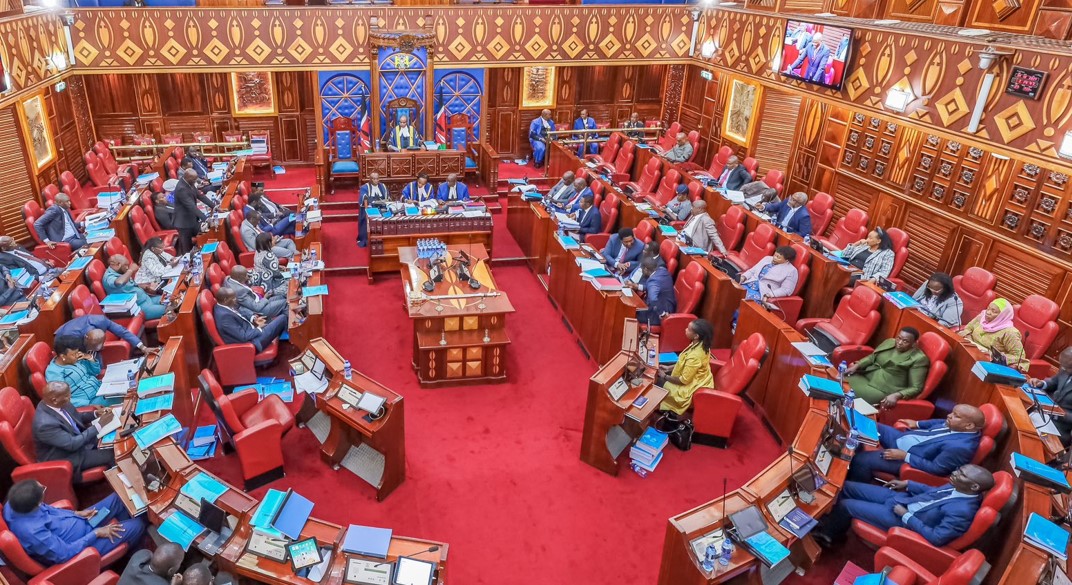Why employers who fail to remit statutory deductions could face criminal charges

Mbadi said he has submitted amendments to the Retirement Benefits Act that will criminalise non-remittance, aiming to safeguard workers’ pension rights and ensure retirees receive their benefits on time.
Employers who deduct statutory contributions from employees’ salaries but fail to remit them to the relevant schemes risk facing criminal charges, Treasury Cabinet Secretary John Mbadi has warned.
Speaking before the National Assembly's Departmental Committee on Finance and National Planning, Mbadi said he has submitted amendments to the Retirement Benefits Act that will criminalise non-remittance, aiming to safeguard workers’ pension rights and ensure retirees receive their benefits on time.
More To Read
- Kenya's voluntary NSSF contributions drop by 47 per cent to Sh1 billion
- State agencies owe Sh6 billion in unpaid statutory deductions, Treasury warns
- Teachers who resigned or were dismissed after April 2018 eligible for pension, says TSC
- 70-year-old man convicted of stealing widow’s Sh752,000 pension
- Senators summon Treasury CS Mbadi over delayed pensions, unremitted benefits
- NSSF holds Sh158 million for 18,000 untraced pensioners, Auditor-General's report reveals
“We have made a legislative proposal to the Senate to criminalise non-remittances of pension benefits. We hope it will be fast-tracked,” he told the committee.
“It is not right for an employee to retire only to start waiting in vain for their benefits. Pension benefits are non-negotiable because somebody has offered services to this country and ought to enjoy their retirement with dignity.”
Currently, failing to remit deductions is not expressly illegal but is treated as a moral obligation for employers. Mbadi decried that most pension schemes owe retirees billions of shillings and are struggling to meet their obligations due to underfunding.
He proposed that institutions with unpaid pensions should present supplementary budgets to Parliament to specifically allocate funds to retirees.
He also revealed that some employers deduct statutory contributions but divert part of the funds for other purposes, such as paying suppliers.
“It is illegal for employers to use deducted money for other purposes, such as paying suppliers. Even in cases where the money is deducted, they are never remitted, especially by the county governments,” he said.
To safeguard workers’ deductions, Mbadi said the National Treasury has written to the Head of Public Service, Felix Koskei, seeking full integration of the payroll for all public servants.
“We need to integrate the payroll so that once money has been deducted from employees, it cannot be used for any other purpose. If it is meant for NSSE, it goes there; if it is for pension, it goes there directly,” he said.
Under the current Retirement Benefits Act, employers who fail to remit contributions are directed by the Retirement Benefits Authority (RBA) to pay the contributions and interest within a specified period, along with a five per cent penalty on unremitted contributions or Sh20,000, whichever is higher, payable within seven days of receiving notice.
The RBA may also issue temporary cessation orders on deductions until the employer remits contributions, and if necessary, facilitate affected employees to join other schemes where their contributions can be properly remitted.
Analysis of Treasury data shows that government agencies and state corporations accumulated Sh6.09 billion in unremitted statutory deductions for the year ending June 30, raising concerns over financial management and accountability.
Unpaid pay-as-you-earn (PAYE) tax grew by Sh4.3 billion to Sh23.39 billion, while pension deductions that were deducted but not forwarded to the relevant funds rose to Sh34.7 billion from Sh33.02 billion.
Unremitted contributions to the Social Health Insurance Fund (SHIF) jumped to Sh125.62 million from Sh76.45 million, putting employees at risk of being denied essential healthcare services.
Meanwhile, NSSF arrears increased slightly to Sh641.58 million from Sh640.94 million, highlighting persistent delays that endanger the financial security of retirees.
A report tabled before the committee in February also revealed that the Local Authorities Pensions Trust, University of Nairobi, and Moi University pension schemes are among the institutions with the highest unremitted contributions.
As of December 31, 2024, the Local Authorities Pensions Trust had Sh8 billion in unpaid contributions, the University of Nairobi Pension Scheme owed Sh8.3 billion, and the Local Authorities Provident Fund held Sh6.8 billion in unremitted funds. Collectively, 47 schemes were holding a total of Sh59,942,470,146 in unremitted contributions.
Committee members pressed for clarity on the missing funds, noting, “This money was deducted and is supposed to be paid to the rightful owner upon retirement. So where is it?” Karachuonyo MP Adipo Okuome posed.
The committee has now summoned the Chief Executive Officers of institutions that owe employees billions in pension contributions for further accountability.
Top Stories Today











































